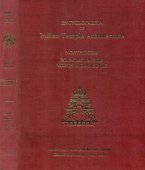Il: 11 definitions
Introduction:
Il means something in Hinduism, Sanskrit, biology, Tamil. If you want to know the exact meaning, history, etymology or English translation of this term then check out the descriptions on this page. Add your comment or reference to a book if you want to contribute to this summary article.
Images (photo gallery)
Biology (plants and animals)
Source: Google Books: CRC World Dictionary (Regional names)Il in India is the name of a plant defined with Strychnos potatorum in various botanical sources. This page contains potential references in Ayurveda, modern medicine, and other folk traditions or local practices It has the synonym Strychnos heterodoxa Gilg (among others).
Example references for further research on medicinal uses or toxicity (see latin names for full list):
· Supplementum Plantarum (1781)
· E-Journal of Chemistry (2007)
· Botanische Jahrbücher für Systematik, Pflanzenge schichte und Pflanzengeographie (1893)
· Flore de Madagascar et des Comores (1984)
· Botanische Jahrbücher für Systematik, Pflanzengeschichte und Pflanzengeographie (1899)
· Genera Plantarum (1873)
If you are looking for specific details regarding Il, for example pregnancy safety, side effects, extract dosage, health benefits, diet and recipes, chemical composition, have a look at these references.

This sections includes definitions from the five kingdoms of living things: Animals, Plants, Fungi, Protists and Monera. It will include both the official binomial nomenclature (scientific names usually in Latin) as well as regional spellings and variants.
Languages of India and abroad
Sanskrit dictionary
Source: DDSA: The practical Sanskrit-English dictionaryIl (इल्).—6 P. (ilati, iyela, ailīt, elitum, ilita) or 1 U. (ilayati or elayati, ailayīt or aililat)
1) To go, to move.
2) To sleep.
3) To throw, send, cast.
4) To keep still, not to move.
5) To become quiet. [cf. Germ. Eile, Gr. elao].
Source: Cologne Digital Sanskrit Dictionaries: Shabda-Sagara Sanskrit-English DictionaryIl (इल्).—[ila] r. 6th cl. (ilati) 1. To sleep. 2. To go. 3. To throw, send or direct: in this last sense, it is also r. 10th cl. (elayati.)
Source: Cologne Digital Sanskrit Dictionaries: Benfey Sanskrit-English DictionaryIl (इल्).—i. 6, [Parasmaipada.] 1. To sleep. 2. To go, [Harivaṃśa, (ed. Calc.)] 620. † 3. To throw; in this signification also i. 10, [Parasmaipada.]
Source: Cologne Digital Sanskrit Dictionaries: Cappeller Sanskrit-English DictionaryIl (इल्).—(ilati come), ilayati be quiet, not budge.
Source: Cologne Digital Sanskrit Dictionaries: Monier-Williams Sanskrit-English Dictionary1) Il (इल्):—[class] 6. [Parasmaipada] ilati (iyela, eliṣyati, ailīt, elitum, [Dhātupāṭha xxviii, 65]) to come, [Harivaṃśa; Viṣṇu-purāṇa];
—to send, cast, [cf. Lexicographers, esp. such as amarasiṃha, halāyudha, hemacandra, etc.];
—to sleep, [cf. Lexicographers, esp. such as amarasiṃha, halāyudha, hemacandra, etc.] : [class] 10. [Parasmaipada] ilayati ([imperative] 2. [plural] ilayatā, [Atharva-veda i, 17, 4]) or elayati ([Pāṇini 3-1, 51]) [Aorist] aililat or ailayīt, to keep still, not to move;
—to become quiet, [Atharva-veda; Taittirīya-saṃhitā; Śatapatha-brāhmaṇa etc.];—
2) [a various reading has the form iL: cf. Old [German] īllu, īllo, for īlju; [modern] [German] Eile; [Cambro-Brit, the language of Wales] il, ‘progress, motion’; [Greek] ἐλάω]
3) Īl (ईल्):—[Causal] [Parasmaipada] īlayati, to move, [Taittirīya-saṃhitā vi, 4, 2, 6] (cf. īr, [Causal])
4) īLā, etc. See under √īḍ.
Source: Cologne Digital Sanskrit Dictionaries: Yates Sanskrit-English Dictionary1) Il (इल्):—(śa) ilati 6. a. To sleep, to move or go, to throw or send.
2) (ka) ilayati 10. a. To throw.
[Sanskrit to German]
Sanskrit, also spelled संस्कृतम् (saṃskṛtam), is an ancient language of India commonly seen as the grandmother of the Indo-European language family (even English!). Closely allied with Prakrit and Pali, Sanskrit is more exhaustive in both grammar and terms and has the most extensive collection of literature in the world, greatly surpassing its sister-languages Greek and Latin.
Kannada-English dictionary
Source: Alar: Kannada-English corpusIl (ಇಲ್):—
1) [verb] (used only in the negative mood of the verbal root of) to be or to exist;2) [verb] ಇಲ್ಲಗೊಳಿಸು [illagolisu] illagoḷisu to destroy; to bring to naught; ಇಲ್ಲದ [illada] illada not present; 2. that is not existing; lacking; ಇಲ್ಲದ ಬದುಕುಮಾಡಿ, ಇಲಿಯಪ್ಪಗೆ ಚಲ್ಲಣ ಹೊದಿಸಿದ [illada badukumadi, iliyappage callana hodisida] illada badukumāḍi, iliyappage callaṇa hodisida (prov.) he puts a hat on a hen; ಇಲ್ಲದಂತೆಮಾಡು [illadamtemadu] illadante māḍu to cause scarcity; 2. to remove completely; to destroy; ಇಲ್ಲದಂದು [illadamdu] illadandu in the absence of; lacking; while not having, ಇಲ್ಲದತನ [illadatana] illadatana the condition of being absent; 2. deficiency in necessary properties or desirable qualities; inadequacy; 3. the state or quality of being poor; poverty; indigence; ಇಲ್ಲದನ್ [illadan] illadan = ಇಲ್ಲದವನು [illadavanu]; ಇಲ್ಲದವನು [illadavanu] illadavanu he who does not have; a man not possessing (the required) knowledge; 2. a poor man; an indigent man; ಇಲ್ಲದೊನ್ [illadon] illadon = ಇಲ್ಲದವನು [illadavanu]; ಇಲ್ಲದಹಾಗೆ ಆಗು [illadahage agu] illadahāge āgu to lose one’s existence; to become nothing; to be destroyed; to be lost from being in possession (as property etc.); ಇಲ್ಲದಾಗು [illadagu] illadāgu = ಇಲ್ಲವಾಗು [illavagu]; ಇಲ್ಲದಿದ್ದರೆ [illadiddare] illadiddare if not; in case it is not; 2. otherwise; or else; ಇಲ್ಲದುದು [illadudu] illadudu that which is not in existence; 2. that which is not a fact; falseness; a false statement; ಇಲ್ಲದೆ [illade] illade (adv .) without a) (something) not being (present, in existence); b) lacking; not with; c) free from; d) with avoidance; 2. besides; apart from (this); ಇಲ್ಲದ್ದು [illaddu] illaddu = ಇಲ್ಲದುದು [illadudu]; ಇಲ್ಲವಾಗು [illavagu] illavāgu to lose one’s existence; to become nothing; to be destroyed; to be lost from being in possession (as property etc.); ಇಲ್ಲವೇ [illave] illavē otherwise; in other circumstances; ಇಲ್ಲವೇ ಇಲ್ಲ [illave illa] illavē illa not at all; not in the least; ಇಲ್ಲಾಗು [illagu] illāgu = ಇಲ್ಲವಾಗು [illavagu]; ಇಲ್ಲದವನಿಗೆ ಒಂದು ಚಿಂತೆ, ಇದ್ದವನಿಗೆ ನೂರು ಚಿಂತೆ [illadavanige omdu cimte, iddavanige nuru cimte] illadavanige ondu cinte, iddavanige nūru cinte (prov.) money brings with it misery; ಇಲ್ಲದವನು ತಲ್ಲಣಿಸನು [illadavanu tallanisanu] illadavan tallaṇisanu (prov.) a destitute need not fear a robber.
--- OR ---
Il (ಇಲ್):—[noun] a place of normal dwelling; a house; a home.
--- OR ---
Īḷ (ಈಳ್):—
1) [verb] to pull; to draw.
2) [verb] to take away money, valuables, property, etc. by force; to rob.
--- OR ---
Īḻ (ಈೞ್):—[verb] = ಈಳ್ [il].
Kannada is a Dravidian language (as opposed to the Indo-European language family) mainly spoken in the southwestern region of India.
Tamil dictionary
Source: DDSA: University of Madras: Tamil LexiconIl (இல்) noun
1. Place; இடம். (பிங்கலகண்டு) [idam. (pingalagandu)]
2. [Telugu: illu, M. il.] House, home; வீடு. ஈனமா யில் லிருந் தின்றி விளியினும் [vidu. inama yil lirun thinri viliyinum] (நாலடியார் [naladiyar] 198).
3. Domestic life; இல்லறம். இல்வாழ்வா னென்பான் [illaram. ilvazhva nenpan] (திருக்குறள் [thirukkural], 41).
4. Wife; மனைவி. புகழ்புரிந் தில்லிலோர்க் கில்லை [manaivi. pugazhpurin thillilork killai] (திருக்குறள் [thirukkural], 59).
5. Lady of rank in towns or forest-pasture tracts; மருதமுல்லைநிலங்களின் தலை வியர். (திவா.) [maruthamullainilangalin thalai viyar. (thiva.)]
6. Family; குடி. இற்பிறந்தார் [kudi. irpiranthar] (திருக்குறள் [thirukkural], 951).
7. Constellation, zodiacal sign; இராசி. (பிங்கலகண்டு) [irasi. (pingalagandu)]
8. Clearing-nut; தேற்றாங்கொட்டை. இல்லா மலகமிரண்டு மயின்றால் [therrangottai. illa malagamirandu mayinral] (இராஜ வைத்தியமகுடம் [iraja vaithiyamagudam] 45).
--- OR ---
Il (இல்) noun < இன்மை. [inmai.]
1. Non-existence; இன்மை. [inmai.] (நாலடியார் [naladiyar] 52.)
2. Death; சாவு. (சூடாமணிநிகண்டு) [savu. (sudamaninigandu)] particle (Grammar) A negative sign; ஒர் எதிர் மறையிடைநிலை. செய்திலேன். [or ethir maraiyidainilai. seythilen.]
--- OR ---
Il (இல்) particle (Grammar)
1. A sign of ablative as in காக்கையில் கரிது களம்பழமலையந்தாதி்; ஐந்தாம்வேற்றுமை யுருபு. [kakkaiyil karithu kalambazham; ainthamverrumai yurupu.] (நன். [nan.] 299.)
2. A sign of the locative as in மணியில் ஒளி; ஏழாம்வேற்றுமை யுருபு. [maniyil oli; ezhamverrumai yurupu.] (நன். [nan.] 302.)
3. If, a suffix of verbs used in a conjunctive sense; வினையெச்ச விகுதி. இருவர்தந்நாளும் பெறில் [vinaiyecha viguthi. iruvarthannalum peril] (விதானமாலை கடிமண. [vithanamalai kadimana.] 17).
Tamil is an ancient language of India from the Dravidian family spoken by roughly 250 million people mainly in southern India and Sri Lanka.
See also (Relevant definitions)
Starts with (+1021): Il-ataikalam, Il-azra, Il-poruluvamai, Il-uraikal, Il-uraiteyvam, Ila, Ila funfun, Ila iroko, Ila kalli, Ila-ilaenal, Ila-karra, Ila-karunkacu, Ila-kulacanrar, Ila-manarpay, Ila-maraka, Ila-nirkattu, Ila-putchi, Ila-veliman, Ila-vincikko, Ilaachi.
Ends with (+1558): A-tyilil, Aavil, Ababil, Abil, Achhegide bondwail, Acil, Addabil, Addambil, Adhyayansheel, Adikil, Adil, Afobil, African foxtail, Agagil, Agasebagil, Aggil, Agil, Agmellil, Aikil, Ail.
Full-text (+255): Ir, Ilvalkkai, Yantrakrama, Illitam, Edaka, Ak'il-suuk, Il-uraikal, Ayal-ilatti, Illanmai, Ak'il-suuc, Mukam-ilvari, Ilporul, Kovil, Maunjibandhanasamskara, Il-azra, Durgasukta, Il-ataikalam, Potuvil, Vanadurgaprakarana, Talai-ileluttu.
Relevant text
One of your search terms exceeds the minimun character amount per search term. This amount currently equals 2.
No search results for Il, Īl, Īḷ, Īḻ in any book or story.
Related products




